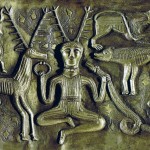Home of the Militant Middle, Another Opinion ("A/O") is an Independent oriented "OpEd" blog for those looking for unbiased facts free of partisan drama and who are willing to question the Status Quo.
Saturday, April 21, 2018
A Place To Belong: Assimilation or Conquest?
The history of the world has been primarily one of conflict. The main source of the that conflict has been the result of a clash of cultures, resulting in wars, conflicts, genocides, brought about by manufactured starvation through the withholding or deliberate destruction on natural resources, the intentional infection of various people by some biological agent (whether they actually understood as such or not), enslavement, or simply being breed out of existence. I'm sure there are many more examples, but you get the picture.
Direct conflict seems to be the most common. We don't know how many people have died as a result of wars or conflicts down through history, though we can make reasonable guesses with increasing accuracy we come closer to the actual event, but even that's occasionally sketchy since no one really takes time to count the dead during a battle and often, war crimes are hidden or written off as something else. We do know, for instance, that approximately 100 million died just in the 20th century alone; perhaps more when events like trauma, wounds, the long term effects of disease or radiation are factored in.
So what happens when cultures come into conflict? Well, first, I think we should define "cultures" to get a better understanding of what we're talking about. Webster's New World Dictionary defines culture as "the ideas, customs, skills, arts, etc of a given people in a given period: civilization". It also includes in the definition "mannerisms or speech". I would expand this to includes values based not just on a common history, but also on a common religion when that religion has been thoroughly integrated throughout society to the exclusion of all others.
Hinduism, which is prevalent in India, is a good example. It, along with a common historical tradition, has created its own value system, including moralistic code of conduct and behavior towards others. It has superimposed a caste system and specific conduct both within the caste and in dealing with those outside of one's own caste for instance (of course, the caste system has, to a large degree, broken down due to outside influences, the least of which being improved education. We can find the same thing in Japan (which has its own history of a caste system as well), China, and throughout Asia and Africa.
Again, most of this has faded due to the influence of mostly outside factors, especially as they became increasingly in contact with the West, which has tended to be more egalitarian by comparison. Both China's and Japan's feudal systems began to lose their influence after contact with American, British, Dutch, and Portuguese sailors increased. Initially, contact was based on the notion of trade; mostly of goods, etc, but pretty soon it encompassed the trade of ideas. I guess we can chalk that up to natural human curiosity! After all, Mankind is an inquiring species. We are hardwired to investigate and explore; to learn through trial and error.
But what if we must deal with two (or more) cultures which come into conflict? Where both are firmly entrenched through their own common histories, evolved laws, values, especially those based on religion or a political ideology? What happens then? When we look at Rome, with its Greco-Roman values and religion(s), we generally find conflict; often violent conflict. We find two competing social systems struggling for dominance. Eventually, it comes down to the one with the strongest military and best social organization which is able most successfully to impose itself on the other. Of course, it's not entirely a "one-way street". Even the weaker culture is sometimes able to imprint itself on the more dominant culture, especially if its stronger than the other in that area (certain medical practices or engineering techniques for instance).
The Celts were, to varying degrees, able to withstand the Roman legions, and thus avoid complete assimilation. The Germanic tribes were much more successful since they were militarily superior to their Celtic cousins as well as made better use of natural barriers. Eventually, Rome began to adopt and adapt to other cultures, languages, and even religions in the name of multiculturalism, even though many had little or no skills which could benefit the Empire; many didn't even bother to learn the language. However, everyone followed the same Roman laws and paid homage to the dominance of the Roman State, at least for a time. But in time, even that failed and Roman collapsed into a series of petty kingdoms, which rose and fell in relation to their own interactions with other cultures. China suffered a similar fate, despite a relatively homogenous population.
However, religion, is often see as a unifying factor, which it is; at least except for the religions it's seeking to replace. It's not uncommon to see the new religion replace the old religion by adopting some of the more popular traditions of the previous religion, including sacred sites. In England for instance, the Christian missionaries would often take over a sacred pagan site by dedicating it to a certain religious figure or "saint" (especially if the "saint" is a native to the region) and/or rededicate it to a specific "miracle" similar to, but slightly different, from the previous religion.
Also, another form of eradication of the previous religion is by converting their gods into sometime to be feared or made fun of. For instances, fairies and sprites, and gnomes became "demons". Snakes, once seen as symbols of power and knowledge, were now reinterpreted as harbingers of evil, like black cats or ravens were. Some are ridiculed, or simply made to be forgotten. The Celtic god of the hunt, Cernunnos, also known as the "horned god" which represented the male aspect of nature, became the prototype of the "devil" or Satan. The more dominate female aspect of nature, such as "The Great Mother", Isis or Hera, was now viewed as evil and twisted; something designed to trick or corrupt Man. Meanwhile, other popular gods and goddesses were renamed and remade as a "saint" or a venerated individual of the new religion such as the Celtic goddess "Brigantia" who became the Christian "Saint Brigit".
So, while religion can be a unifying factor, it can--and usually is---used as a tool of conquest. A more direct form of conquest is, of course, political ideology. Political ideology is pretty straight forward. It's a system of ideas, both theoretical and practical (if based on historical precedence) designed to create a form of societal governance. Out of this, laws to guide (or rule) society are created. These laws tend to evolve out of common practice or traditions and common values (which are, themselves, are strongly influenced by religion or prominent philosophies). Naturally, the dictates of unfolding events and the Will of the King or ruling elite, has a big influence as well.
What happens when a society, which has had time to incorporate a single religion into not just its government (thus becoming a theocracy), but also throughout every aspect of its society into one where the lives of ordinary people are solely governed by the dictates of its religious and political leaders? Historically, we often find that society stagnate. They can evolve and develop as one would expect of a society because of their strict religious dictates. Now, that's not to say they remain frozen in place. They do develop along certain, often very restricted lines so long as the authority of their religion is never brought into question.
That's the cardinal rule which can never be violated under any circumstances. One bright spot is that despite the monolithic structure of a religion, there are always variations within its structure; however, these are usually well defined distinctions. So, while one sect may not be as strict or repressive in one area, that isn't to say it isn't as or more repressive or strict in other areas. It also doesn't keep one sect from attempting to impose its interpretation on the other either. This brings us to the most pressing and relevant question.
What happens when two entirely different cultures, with wholly unique religions, traditions, values, and political ideologies come into contact? Let's look at the West. As a whole, the West tends to be very independent oriented; the individuality of the individual is paramount. It tends to be open when it comes to expressing new ideas or even values. Government is, at least in theory, democratic in that the majority decides based on the present needs of society (in some countries, this still holds true to a degree, while in others, such as the US, it's devolved into an Oligarchy where voters are given the illusion of choice by picking from pre-approved candidates who will represent the needs and wants of a small economic elite).
In terms of social values, there is little variation of the value of genders. Women and men are basically treated the same. Females have equal access to education and opportunities to succeed on their own, as well as hold any position they desire. The same goes for those who step outside traditional gender roles (ie: the LGBTQ communities). This is also true of races. Despite the recently manufactured "racial crisis" in America, anyone who applies themselves can succeed, but equal opportunity does not mean equal results. Much of that depends on the individual themselves, irrespective of their race or gender.
When it comes to religion, the West is highly diverse. At its core, the West has been Christian since roughly the 10th century. At one time, it was nearly unified in that belief, being either Catholic or Eastern Orthodox until the Martin Luther and the Protestant Revolution or Reformation in the 16th Century (and the subsequent Counter Reformation by the Catholic Church) which spread throughout Europe.
Nevertheless, Christianity has been the dominant religion of the West. Judaism has also had a strong presence in the West, beginning with the ancient Romans (most were teachers, slaves, or traders). Of course, Jews were never entirely accepted by Christianity despite its claim of common roots in Judaism. In more recent years, we've seen a decline in organized religion and a rise in more secular beliefs (or in no religious beliefs at all), as well as alternative beliefs. In past centuries, such beliefs were as good way to get tortured, hanged, or burnt at the stake by religious/state authorities. However, it has been the expanse of democratic beliefs; the sovereignty of the individuals, which has made this possible.
Now, can you imagine what would happen with this society comes into contact with another which holds that the state, not the individual, is superior; where gender differences are seen as absolute and any variations (such as education or having a profession, especially one of authority) are ruthlessly enforced or those who cross traditional gender lines are simply beaten, raped, murdered or disfigured out of hand for violating religious laws? What happens when the very notion of democracy and rule of the people by and for the people is seen as abhorrent and in direct conflict with the accepted religious laws? Even basic notions of free expression or speech are largely forbidden; where questioning religious or political authority could be fatal.
What about the notion that female children can "marry" men three or four times their age or that small boys are allowed to be raped? Even females, regardless of their age, may be attacked or raped if out alone or even in pairs, unless they are accompanied by a male relative? How do you feel about being attacked, raped, or beaten if you aren't properly dressed as dictated by someone else's religious laws? How do you feel about having no pets? What about not being allowed to drive or vote? How about watch movies in public, dancing or go clubbing?
How do you feel about slavery? What would you say to a society which, based on its religion, says anyone not of their religion may be stripped of everything and sold into slavery...or murdered indiscriminately? Your only possible alternative would be to pay a steep tax. What would you say if you were told you have very few personal, or even basic, rights because of your gender or religious beliefs? What about demanding that your religion must not "interfere" with theirs, or simply demanding that you not smoke, drink, or eat pork products---or even that none of these can even be advertised? Now, how would you feel if this same society requires you to follow their religious/societal dictates regardless of your personal beliefs?
What do you think the outcome would be if these two vastly differing societies came in close contact with each other? Which of the two would ultimately dominate the other and enforce its will on the other? Well, that's the situation Europe now finds itself in, and that may soon be the situation that the US, Canada, Iceland, Ireland, and Australia may find itself in. The notion of opening one's home to strangers in trouble is an old one; a compassionate one. However, how does handle that same situation when you're inviting individuals into your home who intend on seizing your home and all its possessions; even demanding that you leave?
Historically, differing cultures have rarely coexisted in peace, at least for long. One of two things usually happen. The first is that the host country, under the naive guise of multiculturalism, is fractured; balkanized or divided internally with the gulf becoming wider and deeper until the nation effectively stops being one. At that point, there is usually a Civil War or revolution to decide the country's fate. Sometimes these divisions are based on mythological claims of empire, but like all wars, are often violent and affects everyone, but especially more so if religion is a factor since one is fighting--- murdering and dying---for their god. Obviously, there can be no compromise. That's where we now stand in the West. The only real question is who will dominate; who will be vanquished and who will conquer?
Labels:
Catholics,
Christianity,
civilization,
culture conflict,
democracy,
Europe,
illegal immigration,
Multiculturalism,
Oligarchy,
Protestants,
Radical Islam,
Religion,
society,
UK,
Western culture
Subscribe to:
Post Comments (Atom)



















No comments:
Post a Comment